
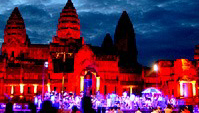

[09]. The ascetic Gotama
The ascetic Gotama went to two well-known teachers to seek a way to defeat
death. They were Alaara Kalaama and Uddaka Raamaputta. Very soon the ascetic
Gotama had mastered all the knowledge of His teachers. However, neither
of them could teach Him the way to end the cycle of birth and death.
The ascetic Gotama left the two teachers and was joined by five of His friends who were also searching for the truth. They were Kondanna, Bhaddiya, Vappa, Mahaanaama and Assaji. Together the friends gave up sensual gratification and tried to find the truth through self- mortification. At this time in India it was thought that the way to purify one's mind was through self-mortification. That is, by giving up eating, drinking and even breathing.
The ascetic Gotama tried all of this. His body wasted away due to lack of food. His beautiful golden skin became darkened and withered. His hair fell out for lack of nourishment. He had by now reduced the amount of food He ate to one mustard seed per day. He was so weak He could hardly move. The Devas said, "Surely the ascetic Gotama has passed away."
The ascetic Gotama realised that He would not reach His goal through self-mortification. Slowly, He started to take nourishment again. He decided to follow the middle path: to avoid the luxuries He had as a prince and also to avoid the extreme sacrifice of His body. His five friends left Him, thinking that the ascetic Gotama had given up His holy life and search for the Truth.
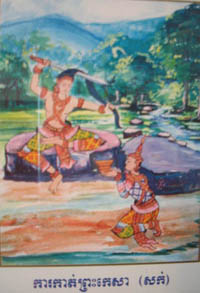
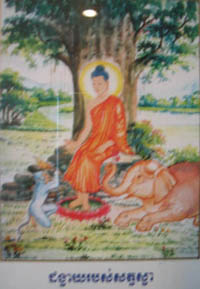
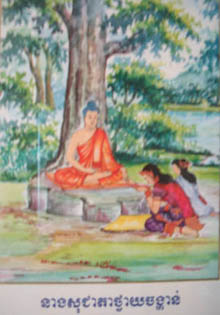
[10]. Sujaataa's
wish
The ascetic Gotama set off on His own and reached the river Neranjara.
He started to meditate under a tree.
In this area there lived a noble lady by the name of Sujaataa. She had taken a vow to the Deva whom she believed lived in this tree, and had prayed for a good son. On having her prayer answered, she prepared a dish of milk rice and went to the tree to offer it to the Deva. On seeing the ascetic so calm and beautiful she offered it to Him, thinking that He was the Deva. She said, "May your wishes be fulfilled just as mine have been."
The ascetic Gotama ate the food, put the bowl into the river, and tested His mind-power by saying, "If I attain the supreme knowledge of enlightenment today, may this bowl float upstream." The bowl floated upstream. This encouraged Him further.
Thereafter He went to Gaya and sat under a tree to meditate, determined to achieve the supreme knowledge on that day
[11]. Enlightenment
It was a full moon day in the month of May. Remembering
how, as a small boy, He had meditated on breathing in and breathing out
at the ploughing festival and reached the first mental absorption (Jhaana),
the ascetic Gotama decided to use this form of meditation.
Maara, the feeling of desire and attachment, seeing that the ascetic Gotama was about to achieve the supreme knowledge, tried to tempt Him with images of His wife and other pleasures. However, the ascetic Gotama was determined and continued His meditation. Finally, He attained the Supreme knowledge known as enlightenment. He attained it in three stages by realising the Four Noble Truths.
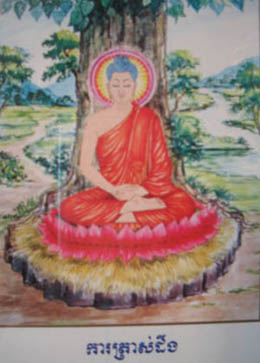
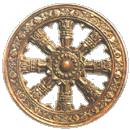

[12].
The seven weeks after enlightenment
In the first week after enlightenment the Gotama Buddha meditated on His
new-found knowledge and enjoyed His new-found happiness.
In the second week He paid respect to the Tree that had given Him shade during His long struggle for enlightenment, by standing at attention and gazing motionless at it. The Tree is now known as the Bodhi Tree: The Tree of Knowledge. A sapling from this original tree is now in Anuradhapura, Sri Lanka. It is the oldest documented tree in the world.
In the third week, seeing that the Devas were still in doubt as to whether He had attained enlightenment, He created a golden bridge with His powers and meditated while walking up and down on it.
In the fourth week he created a jewelled chamber and meditated on the higher teachings (Abhidhamma). At this time His mind and body were so pure and perfect that an aura of six colours emanated from His person. They were blue, yellow, red, white, orange and a mixture of the five. Today the Buddhist flag is made up of these colours.
Each colour represents one noble quality of the Buddha as follows:
Blue - confidence
Yellow - holiness
Red - wisdom
White - purity
Orange - absence of desire
Mixed - all of these qualities
In the fifth week the beautiful daughters of Maara - Tanhaa, Rathi and Ragaa - tried to disturb His concentration by dancing.
In the sixth week He was meditating under the Mucalinda tree when there was a heavy rain. Mucalinda, the king of serpents, coiled round the body of the Buddha seven times and held his large hood over the Buddha's head so that He would not get wet.
In the seventh week the Buddha was meditating under the Raajaayatana tree when two merchants by the name of Tapassu and Bhallika offered him rice cake. This was the Lord Buddha's first meal after enlightenment. The two merchants took refuge in the Buddha and the Dhamma, and became the first lay disciples of the Gotama Buddha.
[13]. His first sermon
The compassionate Gotama Buddha decided that He should teach His new-found
knowledge to mankind so that they too could defeat the cycle of birth
and death.
He saw that His first two teachers, Alaara Kalaama and Uddaka Raamaputta, had passed away. He chose His five friends next, and went to Isipatana where they were residing.
When the five friends saw the Buddha they decided to ignore him. They thought that the ascetic Gotama had given up the holy life, as He had moved away from extreme self-mortification. However, they could not ignore the radiance of His presence.
It was the full moon day in the month of July. At the deer park in Isipatana, the Buddha delivered His first sermon after enlightenment. Dhammachakka is the name given to His first sermon. The meaning of Dhammachakka is "The establishment of wisdom". However, it is often referred to as the "Wheel of truth". After hearing it His friend Kondanna reached the first stage of spiritual development known as Sotaapatti (1).
The Dhammachakka sutta is very important, as in this first sermon the Buddha taught us about the Four Noble Truths and the Middle Path.
The Middle Path is what the Buddha followed to attain enlightenment. He gave up the extreme of wealth and luxuries He had had as a Prince and the extreme self-mortification of torturing His body by withholding the necessities for life. Instead, He used the Middle Path. He catered to the needs of His body rather than to the wants of His mind. This Middle Path that leads to the end of suffering is comprised of the Noble Eightfold Path - namely:
1. Right Understanding
2. Right Thinking
3. Right Speech
4. Right Action
5. Right Livelihood
6. Right Effort
7. Right Mindfulness
8. Right Concentration
Following The Eightfold Noble Path leads to the understanding of the Four Noble Truths which results in Nibbaana. The Four Noble Truths are:
1. Dukkha - That which is difficult to endure - suffering
or dissatisfaction
2. Cause of Dukkha - craving and attachment
3. End to Dukkha - Nibbaana (no more rebirth)
4. The way to end Dukkha - following the Eightfold Noble Path.
--------------------------------------------------------------------------------
(1). Sotaapatti - The first stage of saintliness, also known as "stream enterer". Those who have attained Sotaapatti will attain Nibbaana within seven more births.
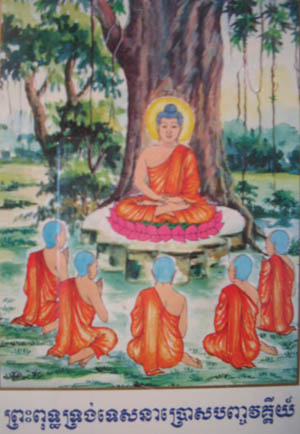
[14]. The teachings of the Buddha
During the next forty-five years the Buddha preached His new-found knowledge
to help mankind and the Devas. He was known as Satthaa Devamanussaanam
- teacher of Devas and humans. Some special features of the teachings
of the Buddha are as follows:
1. The Buddha wanted us to study, investigate and understand His teachings, only accepting them when we found them to be moral and conducive to the well-being and happiness of mankind. The Buddha said, "Do not accept anything on mere hearsay, tradition, rumours, inference, preconceived notions, supposition, or because it seems acceptable. Do not accept anything because the ascetic who taught it is respected by all ...".
Buddhism appeals more to the intellect than the emotion. It is concerned more with the character of the devotees than with their numerical strength. When the millionaire Upaali visited the Buddha with the idea of condemning His teachings, the Buddha patiently taught him the Dhamma. Impressed with His teachings, Upaali wished to join His followers. However, the Lord Buddha advised him saying, "It is well for a distinguished man like you to make a thorough investigation." Upaali, overwhelmed with joy at this unexpected statement said, "If I had become a follower of any other teacher they would have proclaimed the fact that I, Upaali the millionaire, had changed teachers. The more pleased am I." Upaali became a Buddhist by conviction but the Buddha with His boundless compassion advised him to support his former religious teacher as before.
2. The Buddha advised us that at no time should we ever insult or condemn the religion of another. Intolerance is the greatest enemy of religion. Denouncing unfair criticism of other faiths the Buddha states, "It is as a man who looks up and spits at heaven. The spittle does not soil the heaven, but comes back and soils his own person." On another occasion the Buddha said, "If you find truth in any religion, accept that truth."
3. The ordinary precepts that Buddhists follow are not commandments but modes of discipline (sikkhaapada) that they take of their own accord. In Buddhism we are not forced or commanded to do anything. We follow the teachings of the Buddha of our own free will because we understand and believe in them.
4. Buddhism teaches non-violence. In the Dhammapada (Law Verses) the Buddha said:
"All fear the rod,
Life is dear to all.
Feeling for others as for yourself
You should neither slay,
Nor cause others to slay."
Following, understanding and accepting the teachings of the Buddha, Buddhists take the first precept 'paanaatipaataa veramani sikkhaapadam samaadiyaami' which means 'I undertake to observe the precept of abstaining from destroying living beings'.
To the unique credit of Buddhism, it must be said that throughout the peaceful march of 2600 years, no drop of blood has been shed in the name of the Buddha, and no mighty monarch has wielded his powerful sword to spread the Dhamma.
5. The Buddha taught us to be compassionate to all living beings. In the Karaniya Metta Sutta the Buddha said:
"As a mother protects her only child,
Even at the risk of her own life,
Let one cultivate boundless thoughts of loving kindness.
Towards all living beings."
6. The Buddha taught us that we must show love and kindness to our enemies and those we do not like. He did not believe in revenge and an eye for an eye. In the Dhammapada the Buddha said:
"Conquer anger by loving kindness.
Conquer evil by good.
Conquer the stingy by liberality.
Conquer the liar by truthfulness."
7. The Buddha advocated equality for all mankind. He attempted to abolish slavery and the degrading caste system in Indian society. He declared:
"By birth is not one an outcaste,
By birth is not one a brahmin.
By deeds is one an outcaste,
By deeds is one a brahmin (1)."
According to the Buddha's teaching, caste or colour do not prevent one from becoming a Buddhist or joining the order of the Sangha (Buddhist monks). Fishermen and scavengers, together with warriors and brahmins were freely admitted to the order of the Sangha and given positions of high rank.
Upaali the barber was chief disciple in matters pertaining to the discipline of the Sangha (Vinaya). Sunita, who was honoured by kings as an Arahanth (2), was a scavenger. Rajjumala and Punnaa were slave girls.
8. The Buddha also raised the status of women by starting the order of the Nuns. He saw the good in both men and women. Gender is no barrier to spiritual development and religious service. At that time in Indian society women were often treated as inferior to men. When Queen Mallikaa gave birth to a baby girl, the Buddha comforted the distraught King Pasenadi by saying,
"A female child may prove even better than a male offspring."
9. Rebirth and kamma are also integral parts of Buddhism. According to the teachings of the Buddha, life does not end at death. One is reborn instantaneously. Though many great teachers of the East advocate rebirth, it is not a belief exclusively for the East. Many great men in the West believe in rebirth. Among its advocates we have scientists like Thomas Huxley, who was responsible for introducing science to the 19th century British school system, Professor Gustaf Stromberg, the famous Swedish astronomer, Professor Julian Huxley, the distinguished British scientist, philosophers like Pythagoras and Plato, poets like Shelley, Tennyson and Wordsworth, and American industrialist Henry Ford.
Our life is a result of our kamma. We are not brought to this world by anyone but ourselves. It is the result of a cause. The cause is delusion (avijja). To understand this theory, we need to develop our minds through meditation.
Kamma means action. Vipaka means results. Good actions cause good results. Bad actions cause bad results. The Buddha said, "Whether you are in the sea, the air, or in a cave, you cannot hide from the effects of your bad kamma." That is the Law of Kamma. It must be stressed, however, that it is the intention behind the action and not just the action alone that sets off the reaction (vipaka). As Buddhists we refrain from bad actions and perform good actions because we know that one day, either in this birth or in a future birth, the effects of our actions will come back to us. We know that not even the Buddha can save us from the effects of our bad actions.
As Buddhists, we understand that due to the Law of Kamma, bad things can happen to a good person just as good things can happen to a bad person. We see the bigger picture. We go back into our past lives and understand that these are the results of our past bad actions. As such, we do not blame any divine powers for our misfortunes. Knowing that we are now paying for the results of our past bad actions, we take heed and ensure that we improve and not make the same mistake again. We learn from our misfortunes by doing good and avoiding bad actions.
10. The Buddha taught us that you are your own saviour. No all-powerful God can help us to attain Nibbaana. No God can help us to escape from the effects of our own actions. As such, you make your own destiny. Mind is supreme. In Buddhism we learn to control our minds and our destiny. We rely on no one but ourselves. The Buddhas show us how. They are our teachers. It is up to us to follow Their teachings of the Noble Eightfold Path, to control and purify our minds through meditation and attain our own salvation. The teachings of all Buddhas can be summed up in three lines:
"Do no evil, Do good, Purify the mind."
--------------------------------------------------------------------------------
(1). Vasala sutta
(2). Arahanth - One who has attained Nibbaana
[15]. The Parinibbaana of the Lord Buddha
The Buddha was eighty years old. The time was near for the passing away
(parinibbaana) of the Lord Buddha. The Buddha had advised Venerable Aananda,
His attending monk, that He would be passing away in three months.
The Buddha proceeded to walk to the city of Kusinaaraa. On the way a man by the name of Pukkusa heard His Dhamma (1) and offered Him two golden robes. As directed by the Buddha he robed the Buddha with one and Venerable Aananda with the other. When the Buddha was robed Venerable Aananda was surprised to see that the skin of the Holy One was exceedingly bright, so that the golden robe appeared dull in comparison. The Buddha informed Aananda that the Tathaagata's (2) skin becomes clear and exceedingly bright on two occasions: the night on which He attains Buddhahood and the night on which He passes away. He then announced that on the third watch of the night He would pass away in the Sala grove of the Mallas.
It was a full moon day in the month of May. The Lord Buddha reached the Sal garden of the Mallas and saw that the twin Sal trees were in full bloom even though it was out of season. He then said, "It is not thus that the Tathagata is respected, venerated, honoured and revered. Whenever a Bhikku or Bhikkuni, Upaasaka or Upaasikaa lives in accordance with the Teachings, conducts himself dutifully and acts righteously, it is he who respects, reverences, venerates, honours and reveres the Tathaagata with the highest homage."
The Buddha then lay down on a couch prepared by Aananda, on His right side with His head facing north. At this time, Subhadda, a wandering ascetic, came to Him to clear up a doubt. Happy with the Buddha's teachings, he took refuge in the Buddha, the Dhamma and the Sangha, and requested permission to be a monk. He was the last personal disciple of the Buddha.
Just before the Buddha passed away many disciples came to pay their respects to Him. One monk, however, did not come. Instead, he remained in his abode, deep in meditation. On being asked the reason for his absence the monk said, "Lord, I knew that Your Reverence would pass away shortly and I thought that the best way to honour the Teacher was by attaining Arahantship before the passing away of Your Reverence." The Buddha, pleased with his reply, said: "Excellent, excellent! He who loves me should act as this monk. He honours me best who practises my teaching best."
Finally, the Buddha addressed His disciples and said these words: "Subject to change are all component things. Strive on with diligence." These were His last words. It was the full moon day in the month of May in the year 543 B.C. In the third watch of the night the Blessed One passed away.
(1). Dhamma - His teachings
(2). Tathaagata - Another word for Buddha
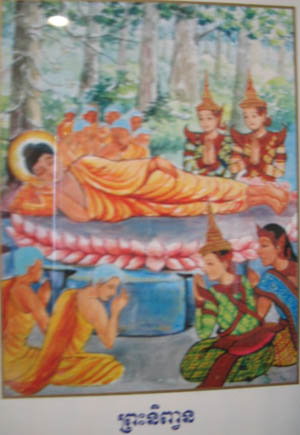
[16]. What they say about Him and Buddhism
It is now over two thousand five hundred years since the passing away
of the Lord Buddha. The teachings of the Buddha remain true, a monument
to His greatness. This is what some well- known persons, who have studied
His teachings, say about Him and His teachings.
"The religion of the future will be a cosmic religion. It should transcend a personal God and avoid dogmas and theology. Covering both the natural and the spiritual, it should be based on a religious sense arising from the experience of all things, natural and spiritual, and a meaningful unity. Buddhism answers this description. If there is any religion that would cope with modern scientific needs, it would be Buddhism." -- Prof. Albert Einstein
"Buddhist or no Buddhist, I have examined every one of the great religious systems of the world; and in none of those have I found anything to surpass in beauty and comprehensiveness the Noble Eightfold Path of the Buddha. I am content to shape my life according to that path." -- Prof. Rhys Davids
"Alone of all the great world religions, Buddhism made its way without persecution, censorship or inquisition. In all these respects its record is enormously superior to that of Christianity, which made its way among people wedded to materialism and which was able to justify the bloodthirsty tendencies of its adherents by an appeal to the savage bronze-age literature of the Old Testament." -- Aldous Huxley
"Of the great religions of history, I prefer Buddhism, especially in its earliest forms, because it has had the smallest element of persecution." -- Lord Bertrand Russell
"To go to Him for refuge, to sing His praise, to do Him honour and to abide in His Dhamma is to act with understanding." -- Poet of ancient India
"Indian pacifism finds its complete expression in the teaching of the Buddha. Buddhism teaches ahimsa or harmlessness towards all beings. It forbids even laymen to have anything to do with the manufacture and sale of arms, with the making of poisons and intoxicants, with soldiering or the slaughtering of animals." -- Aldous Huxley
"In Gotama the Buddha we have a mastermind from the East second to none so far as the influence on the thought and life of the human race is concerned, and sacred to all as the founder of a religious tradition whose hold is hardly less wide and deep than any other. He belongs to the history of the world's thought, to the general inheritance of all cultivated men, for, judged by intellectual integrity, moral earnestness and spiritual insight, he is undoubtedly one of the greatest figures of history." -- Sri Radhakrishnan (Gotama The Buddha)
"The Greatest Man ever born." -- Great Poet Tagore
"In the Buddha you see clearly a man, simple, devout, lonely, battling for light, a vivid human personality, not a myth. He too gave a message to mankind universal in character. Many of our best modern ideas are in closest harmony with it. All the miseries and discontents of life are due, He taught, to selfishness. Before a man can become serene he must cease to live for his senses or himself. Then he merges into a greater being. Buddhism in different language called men to self-forgetfulness 500 years before Christ. In some ways He was nearer to us and our needs. He was more lucid upon our individual importance in service than Christ and less ambiguous upon the question of personal immortality." -- H. G. Wells (Three Greatest Men in History)
"The more I know Him the more I love Him." -- Fausboll (Danish
scholar)
"I know nothing more grand in this world than the figure of the Buddha. It is the perfect embodiment of spirituality in the visible domain." -- Count Kaiserling (Travel Diary of a Philosopher)
"The Buddhist moral code is one of the most perfect which the world has ever known." -- Prof. Max Muller
"The scriptures of the Saviour of the World,
Lord Buddha - Prince Siddaartha styled on earth -
In Earth and Heavens and Hells Incomparable,
All-honoured, Wisest, Best, most Pitiful (Compassionate);
The Teacher of Nirvaana and the Law." -- Sir Edwin Arnold (The Light
of Asia)
"May the Dhamma last as long as my sons and grandsons and the sun and the moon will be, and may the people follow the Path of the Dhamma, for if one follows the path, happiness in this and in the other world will be attained." -- Emperor Asoka of India
Bibliography
Baptist Egerten, The Advent of a Supreme Buddha, Colombo, Sri Lanka: Tusitha Printing, 1974.
Naarada Mahaa Thera, The Buddha and His Teachings, Colombo, Sri Lanka: Messrs Apothecaries' Co., 1973.
Maithreya Ananda Balangoda Mahaa Naayaka Thera, The Life of the Buddha for Young people, Singapore: Singapore Buddhist Meditation Centre, 1985.
Siridhamma Venerable, The Life of the Buddha, Kuala Lumpur: Buddhist Missionary Society, 1983.
Upali Group, Budu Maga, Sri Lanka: Lakmini R. Wijewardene, Upali Group of Companies, 1990.
Yogavacara Rahula Bhikkhu, The Way to Peace and Happiness, Colombo, Sri Lanka: Mrs. H. M. Gunasekera Trust.
Copyright ©August, 2003 Khmer-Canadian Buddhist Cultural Centre.
All Rights Reserved (unless otherwise stated).
Started: Wed, August 13, B.E.2547,A.D.2003, Last Updated: May 7, B.E.2547, A.D.2004